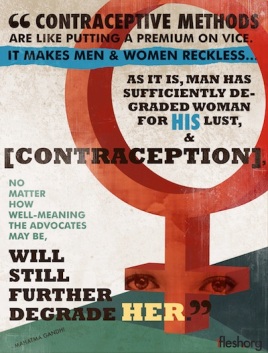
After several days of silently following the Target debate on various social media sites, I think it’s about time that I add my two sense on the matter. I have read articles that make all sorts of claims: Conservatives argue … Continue reading

After several days of silently following the Target debate on various social media sites, I think it’s about time that I add my two sense on the matter. I have read articles that make all sorts of claims: Conservatives argue … Continue reading
 Two weeks ago, I had my six-week postpartum appointment, a visit that many Catholic couples dread. They often find themselves on the defensive as they try to explain why they don’t need to be sent home with a pack of condoms and a prescription for the pill. But when they try to explain that they plan to use Natural Family Planning (NFP) to prevent pregnancy, many doctors will try to convince them to consider other options. And the criticism often extends beyond our doctors. Couples who choose to use NFP are often criticized by friends and family as well, people whose opinions matter to them. In my experience, a lot of the arguments against the use of NFP revolve around three myths, each of which emerges from a misconception regarding the nature of NFP. Some of these myths do have some truth to them, but it’s important that we sort out what is fact and what is fiction before we make any judgments on the value of Natural Family Planning.
Two weeks ago, I had my six-week postpartum appointment, a visit that many Catholic couples dread. They often find themselves on the defensive as they try to explain why they don’t need to be sent home with a pack of condoms and a prescription for the pill. But when they try to explain that they plan to use Natural Family Planning (NFP) to prevent pregnancy, many doctors will try to convince them to consider other options. And the criticism often extends beyond our doctors. Couples who choose to use NFP are often criticized by friends and family as well, people whose opinions matter to them. In my experience, a lot of the arguments against the use of NFP revolve around three myths, each of which emerges from a misconception regarding the nature of NFP. Some of these myths do have some truth to them, but it’s important that we sort out what is fact and what is fiction before we make any judgments on the value of Natural Family Planning.
Myth 1: Natural Family Planning is unscientific.
There’s a common misconception that NFP is the same thing as the rhythm method, an outdated mode of preventing pregnancy that was erroneously based on the falsity that all women have a 28-day cycle and/or that ovulation takes place halfway through a woman’s cycle (I’ve heard it explained both ways). Both of these assumptions are wrong. Most women do not have a 28-day cycle. In fact, most women who are considered normal don’t have a 28-day cycle. Theirs might be 24 days or 32 days, but just those few days of discrepancy would be enough to make the rhythm method useless. Even if your cycle is only off by a few days, unless you choose to leave a huge margin of error, there’s a chance you’re going to wind up with an unplanned pregnancy. Similarly, if a woman’s cycle is shorter or longer than the typical 28 days, then ovulation will not take place at the halfway point, but a few days before or a few days after.
 So yes, the rhythm method is not overly scientific. And the science that it is based on is inherently faulty. A family planning method that simply takes the length of your cycle, splits it in half, and tells you not to have sex at the halfway point is not highly scientific. But NFP is not the rhythm method.
So yes, the rhythm method is not overly scientific. And the science that it is based on is inherently faulty. A family planning method that simply takes the length of your cycle, splits it in half, and tells you not to have sex at the halfway point is not highly scientific. But NFP is not the rhythm method.
In fact, there is not just one form of NFP. There are actually quite a few, and many of them are based on sound science. As a DRE who does Pre-Cana, trust me, no one in the Catholic Church takes the rhythm method very seriously.
Other forms of NFP are much more scientific. Many methods take into consideration women’s hormone levels and the resulting physiological changes that go along with changes in those levels. Creighton model relies on changes in women’s cervical fluid. Sympto-thermal also considers the change in women’s basal body temperature at ovulation. Ovacue uses the electrolytes in a woman’s saliva to chart her fertility. Each method is different, but they’re all based on sound science.
There might have been a time in history when the rhythm method was considered revolutionary and ahead of its time. It applied mathematics to the woman’s cycle and was based on what was then considered sound scientific observations. The rhythm method seemed incredibly logical, and it wasn’t until the discovery of one incredibly important fact- that ovulation is not always the halfway point of a women’s cycle- that the entire method fell apart. Its science was finally debunked. It was not the first or last time that a theory that seemed like “sound science” became highly unscientific. The fields of science and medicine can both attest to that fact- advances in science depend on it. Today’s methods of Natural Family Planning are undeniably more scientific than the rhythm method. I would even argue that the science that supports modern methods of NFP are also more scientific than most forms of contraception used today. There’s nothing scientific about a condom or an IUD. They’re just pieces of plastic that act as semen-blockers. And as for the pill, considering all the negative side effects (discussed here), I would feel much more comfortable trusting the science of NFP rather than the science behind the pill. At least I can understand how NFP works with my body.
 Myth 2: Natural Family Planning is unreliable.
Myth 2: Natural Family Planning is unreliable.
This myth is occasionally tied up with the first myth. If NFP is considered synonymous with the rhythm method, it will inevitably be considered unreliable- because the science is faulty. Consequently, the second myth can be debunked in the same manner as the first. The rhythm method is NFP insofar as it is natural and a method of family planning, albeit a poor one. And for a small percent of women, it actually does work- not because the method is reliable, but because some women’s cycles are that reliable. But as I said earlier, most, if not all, women using NFP to monitor their fertility are not using the rhythm method.
Some people who object to NFP know enough about it to know that there are multiple methods, and they also object to the reliability of the other forms. How reliable can a method be that relies so heavily on human observations? How can we trust a method of preventing pregnancy that is so open to human error? If you forget to make an observation, you might get pregnant. If you get negligent with your charting, you might get pregnant. If you get complacent with your observations and start making assumptions based on the past, you might get pregnant. If you decide to have sex when you know you’re fertile, you might get pregnant. If you make one mistake, you might get pregnant. Does that sound like a reliable form of birth control?
 But it is. It is not the method that is unreliable in the above scenario. It is the user. But an unreliable person is just as likely to forget or choose not to use a condom, or to forget to take the pill a few times. Women who use NFP responsibly are much less likely to get pregnant. In fact, many methods of NFP are 96-99% effective if user correctly. That’s the same rate as the pill, and even better than a condom. If we believe that women can be responsible enough to take the pill every day or that men are responsible enough to use a condom every time, we should be able to say the same about the woman using NFP. If she can remember to pop the pill, she is equally capable of remembering to chart her fertility. And like most parts of our daily routine, if you get into the habit of charting regularly, it will become second-nature. Ultimately, many methods of NFP are very reliable, and I think we need to put more faith in our own sense of responsibility- which brings me to the third myth.
But it is. It is not the method that is unreliable in the above scenario. It is the user. But an unreliable person is just as likely to forget or choose not to use a condom, or to forget to take the pill a few times. Women who use NFP responsibly are much less likely to get pregnant. In fact, many methods of NFP are 96-99% effective if user correctly. That’s the same rate as the pill, and even better than a condom. If we believe that women can be responsible enough to take the pill every day or that men are responsible enough to use a condom every time, we should be able to say the same about the woman using NFP. If she can remember to pop the pill, she is equally capable of remembering to chart her fertility. And like most parts of our daily routine, if you get into the habit of charting regularly, it will become second-nature. Ultimately, many methods of NFP are very reliable, and I think we need to put more faith in our own sense of responsibility- which brings me to the third myth.
Myth 3: Natural Family Planning is unrealistic.
This is the myth that most people do not want to discuss, but is always taken for granted as being true. It draws from our own human weakness, something that many people want to simultaneously affirm and deny. We are told that we should be in control of our bodies, that no one should ever tell us how our bodies are to be used. It’s the basis of the whole female reproductive rights movement- women deserve to have control over their bodies. And yet, at the same time, we tell women that they cannot control their bodies- or at least their sexual drive.
 Though most people are more than happy to argue about how unscientific and unreliable NFP are, there is another argument that they often refuse to voice but assume to be true: NFP is unreasonable because it’s ridiculous to assume that people can say ‘no’ to sex when they are fertile. While we might fight to control our bodies, apparently there is no need or reason to control our sexual drive. Apparently, when it comes to sex, we’re animals. We can’t resist the urge. We can’t abstain for even a few days of the month. There is apparently no need for the virtue of chastity in this world. No need for self-control when it comes to one’s sexuality. Most people assume that NFP won’t work because men and women are apparently incapable of saying ‘no’ to sex at any time.
Though most people are more than happy to argue about how unscientific and unreliable NFP are, there is another argument that they often refuse to voice but assume to be true: NFP is unreasonable because it’s ridiculous to assume that people can say ‘no’ to sex when they are fertile. While we might fight to control our bodies, apparently there is no need or reason to control our sexual drive. Apparently, when it comes to sex, we’re animals. We can’t resist the urge. We can’t abstain for even a few days of the month. There is apparently no need for the virtue of chastity in this world. No need for self-control when it comes to one’s sexuality. Most people assume that NFP won’t work because men and women are apparently incapable of saying ‘no’ to sex at any time.
Just as the second myth assumes that we can’t be responsible, the third one assumes that we can’t be chaste. Some opponents of NFP assert that it’s just not possible to remain abstinent during fertile times, that a method of family planning that depends on our ability to resist our urge to have sex is doomed to fail. Considering the fact that there are plenty of couples out there using NFP successfully, it would appear that the assumption that we can’t say ‘no’ is false.
But there are some people who would not go so far. Sure, it might be possible that people can and do say ‘no,’ but should they have to?
And I think that argument gets to the crux of the matter. NFP is hard. It requires that we find other ways to express our love for one another at certain times of the month. There are plenty of people out there who won’t give NFP a chance simply because they don’t want to have to say ‘no’ when they want to say ‘yes.’ But I would argue that a relationship will be healthier if both spouses can say ‘no’ from time to time. Because they’re saying ‘no’ to one thing, they are saying ‘yes’ to so much more. They are saying ‘yes’ to multiple date nights as couples find different ways to show their love. They are saying ‘yes’ to a method of preventing pregnancy that respects the man and woman’s bodies, their relationship, and the conjugal act itself. They are saying ‘yes’ to God and His plans for their lives. And those ‘yes’s’ mean so much more than that single ‘no.’

No one would be surprised to learn that there are certain divisions within the pro-life movement. You just need to attend a single March for Life to realize that many types of groups will be represented: Catholics, Protestants, Muslims, Jews, … Continue reading

While Pope Francis was here for his whirlwind visit to the United States, my Facebook newsfeed was bombarded by positive responses to his words and actions. People applauded his time with Catholic Charities. They approved of his words on human … Continue reading

I might have missed the boat a little on this one, but I don’t think it’s too late to add my two cents on the latest controversial topic. The big reveal might have been more than a week ago, but … Continue reading

As you might remember, several months ago I wrote a response to a young woman who regretted her decision to wait until marriage before becoming sexually intimate. In response to that post, several people wrote me emails pointing out that … Continue reading

I dedicate this newest post to all mothers and fathers who have ever lost a child, born or unborn. In light of the death of Walter Fretz and numerous posts on the place of miscarriage in America, I would like … Continue reading

This past week, “Big Bang Theory” actress Kaley Cuoco made the bold claim she “was never that feminist girl,” a claim that she recanted just days later. Was she forced? It seems highly likely. Was I suspicious? Of course. Cuoco … Continue reading

A few nights ago I stumbled on a blog post that really broke my heart, and I’ve just felt compelled to write a response post. I’ve never done this before, but in this instance, I just don’t feel comfortable remaining … Continue reading